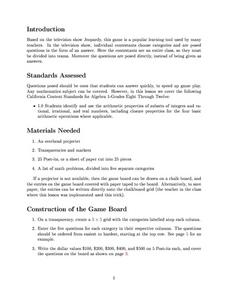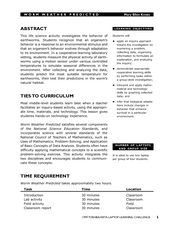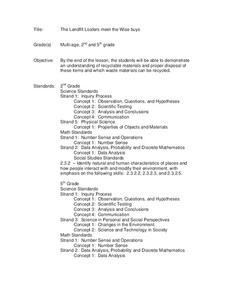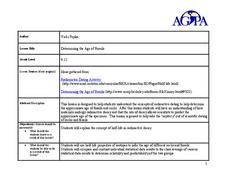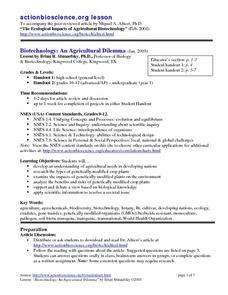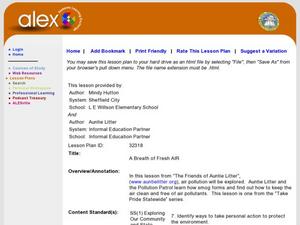Curated OER
Rube Goldberg Project
Young scholars apply inquiry and problem solving approaches in science. They design a device (invention) that solves a special problem.
Curated OER
Mathematical Jeopardy
Middle schoolers use the popular game of Jeopardy to explore different mathematical concepts. They are highly engaged with the use of technology for this lesson. They function using higher-order thinking skills in order to create their...
University of Colorado
The Jovian Basketball Hoop
A radio receives radio signals, converts them to an electrical signal, then converts this signal to a sound signal, and amplifies the sound so people can hear it. Class members use this information to create a short-wave radio antenna...
University of Minnesota
What's the Deal? Addiction Card Game
Addiction is a big deal! Playing a game of cards helps learners understand the concept of addiction. Through their analysis, they examine the potential for addiction and how it varies for each individual.
Curated OER
Observations and Inferences
Students observe how to distinguish observations form inferences. In this examining inferences lesson students list observations relating to the activity and discuss the importance of them.
Curated OER
Worm Weather Predicted
Students examine worm habitats. In this animal habitats lesson, students participate in a lab activity that requires them to explore the adaptations that earthworms make to their environment.
University of Colorado
The Moons of Jupiter
Middle schoolers analyze given data on density and diameter of objects in space by graphing the data and then discussing their findings. This ninth installment of a 22-part series emphasizes the Galilean moons as compared to other objects.
Curated OER
The Landfill Loafers Meet the Wise Buys
Students discover recyclable materials and the proper disposal of those items through Internet research. Working in groups of four, they search the Internet for uses of recyclable materials. After research is complete, they participate...
Curated OER
Red, Green, and Blue Mystery Liquids! Hypothesis or Inference?
Eighth graders are actively involved in the scientific method and inquiry as they form quick hypotheses based upon a teacher set of mystery liquids. They determine the need to make additional observations of the liquids.
Curated OER
Maintaining Plant Genebanks
Students examine the use, costs, and the need for plant gene banks. The rationale for gaining ownership over scientific information and the implications of the developing nations' reliance on biotechnology is explored in this...
Curated OER
Applied Evolution: How Will We Get There from Here?
Students explore the basic process of natural selection and how people can manipulate that process today. The consequences of natural selection on daily life and the implications of evolutionary biology in basic and applied science is...
Curated OER
Determining the Age of Fossils
Students examine the concept of radioactive dating. In this radioactive dating lesson plan, students investigate how to determine the ages of fossils and rocks as they learn about half-life radioactive decay.
Curated OER
Gridding a Site
Students establish a grid system over an archaelogical site. They label each grid unit. They determine the location of artifacts within each grid unit. They construct a scientific inquiry concerning the location of artifacts on the site.
Curated OER
Biotechnology: An Agricultural Dilemma
Students investigate the types of genetically modified crop plants there are and the benefits and risks of such plants. The agricultural needs in developing nations for this biological knowledge to resolve societal issues is also...
Curated OER
Exploring the Circulatory System: Getting to the Heart of It All
Seventh graders study how the heart functions and its parts. For this circulatory system lesson students learn how to take their pulse, blood pressure and respiration.
Curated OER
Bluebirds
Students use the internet to gather information on bluebirds. In groups, they observe and record the size, color and various sounds of the birds. They view photographs of the birds in different stages of development and discuss how...
Curated OER
What is Wrong with My Pond?
Students examine various pond water samples to identify water quality. In this water quality lesson, students will identify levels of nitrates, ammonia, pH, hardness,and alkalinity in pond water. They will explain importance of water...
Curated OER
Bird Ecology Unit
Birds, plants, and vegetation, is there anything more lovely? There is! Engage your class in the scientific process, data collection, and data analysis. They stroll their campus observing and identifying various birds and plants,...
Curated OER
Mercury in the Environment
Students develop abilities necessary to do scientific inquiry. They develop an understanding of chemical reactions, structures and properties of matter. They develop decision-making skills in natural and human-induced hazards.
Curated OER
Ramps 2: Ramp Builder
Students design, build, and test their own ramps. They are introduced to a variety of materials and explore putting them together. Students engage in an inquiry-based learning experience to reinforce math, science, and technology...
Curated OER
Journal Introductions
Students explore the idea of scientific observation and the use of a journal to record their observations. They examine the proper vocabulary used when describing scientific inquiry. Students observe a science experiment and they discuss...
Curated OER
A Breath of Fresh Air
Students explore the primary function of the respiratory system in multiple activities. In this respiratory system lesson, students build a model of the respiratory system to investigate how the lungs work.
Curated OER
Forest Friends Forever
Students investigate how to use the senses to gather information about objects such as size, shape, color, texture, sound, position, and change (qualitative observations are utilized throughout this lesson). They investigate and explain...
Curated OER
Look At Those Leaves!
Students sort tree leaves. In this plant biology lesson, students collect leaves and group them according to size, shape, and color. Students discuss their observations.



